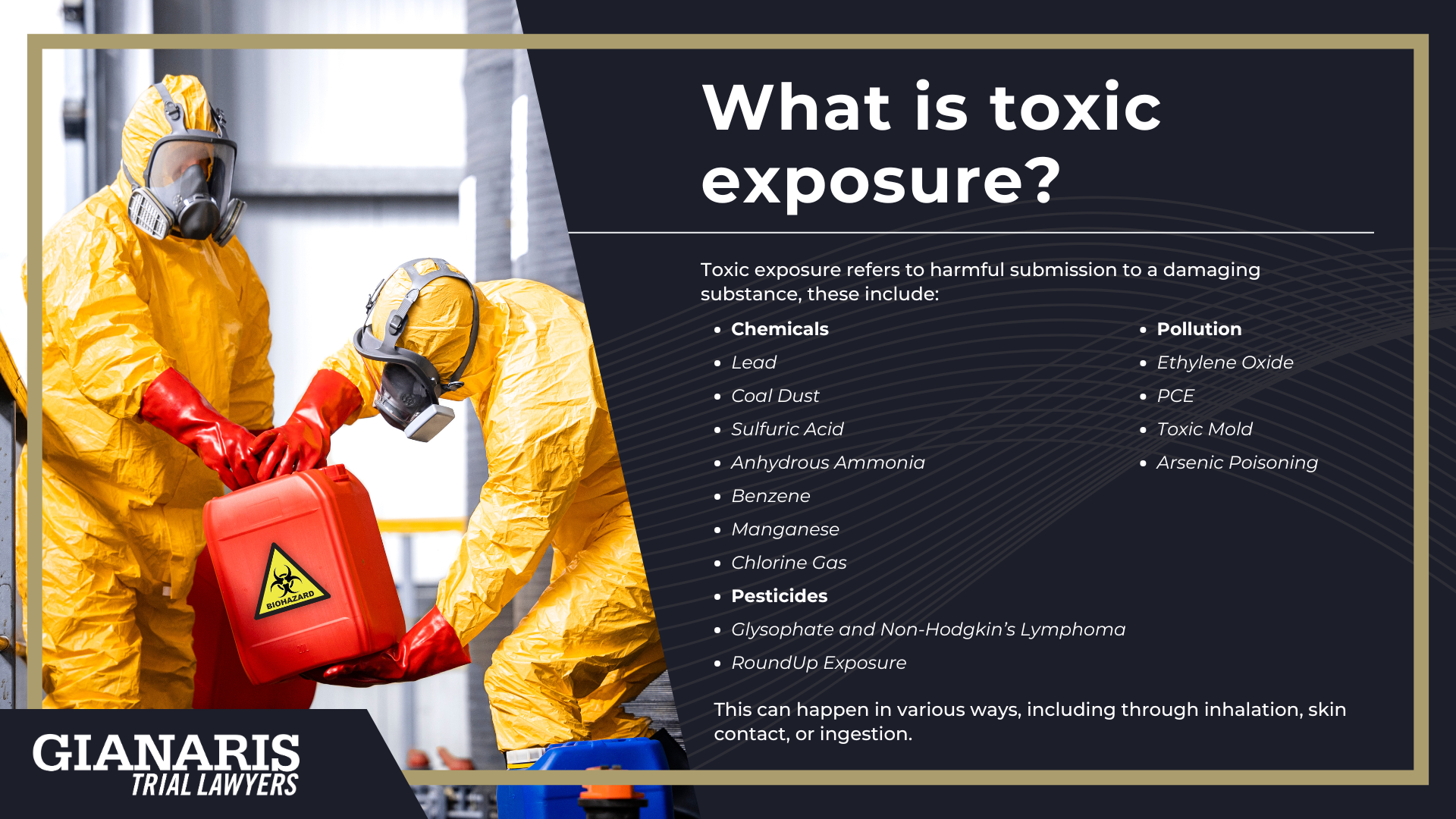At Gianaris Trial Lawyers, we understand the serious health risks of toxic exposure.
These exposures can happen at work, in homes, and in neighborhoods.
We are dedicated to helping individuals and families who have been affected by toxic exposures fight for their rights and seek justice.
Our experienced toxic exposure lawyers deeply understand the complex laws and regulations related to toxic exposure.
We have successfully represented clients in many toxic exposure cases, including those involving deadly dust, benzene, lead, pesticides, and other hazardous chemicals.
If you or a loved one has been exposed to toxic substances and are experiencing health problems as a result, we can help.
We will work with you to investigate your case, gather evidence, and build a strong legal claim.
We will also help you navigate the legal process, including filing a lawsuit and negotiating a settlement or going to trial.

In addition to seeking compensation for your medical expenses and lost wages, we will also fight for your right to be compensated for your pain and suffering.
We understand that toxic exposures can have a serious impact on your quality of life, and we will work tirelessly to help you get the justice you deserve.
If a loved one has died from a toxic exposure or cancer caused by a toxic exposure, we will fight for your family.
Don’t hesitate to contact us for a free consultation.
Our toxic exposure lawyers are here to help you understand your rights and options and to guide you through the legal process.
Together, we can hold those responsible for your toxic exposure accountable and help you get the compensation you need to move forward.
Toxic exposure refers to harmful exposure to a toxic substance, such as chemicals, pesticides, or pollution.
This can happen in various ways, including through inhalation, skin contact, or ingestion.

Symptoms of toxic exposure can vary depending on the type of toxin and the level of exposure.
Common symptoms include headaches, dizziness, respiratory problems, skin irritation, and nausea.
In severe cases, toxic exposure can lead to organ damage or even death.
Yes, toxic exposures can and do cause cancer, sometimes years after the exposure.
For example, deadly dust causes many types of cancer, chemical exposures cause blood cancer, and diesel exhaust exposure causes lung, blood, and organ cancer.
We investigate your exposure, and our medical experts determine the cause of your cancer.
Toxic exposures years ago can cause injuries even decades later.
Cancer often takes years to develop after a toxic exposure.
An experienced toxic exposure lawyer’s team can investigate even decades old exposures.
If you suspect that you have been exposed to a toxic substance, it is important to seek medical attention immediately.
If the exposure was recent, stay away from the toxic substance and have it removed by an abatement professional.
If you are sick from a toxic exposure, call our experienced toxic exposure lawyers, who can help you navigate sampling the substance and having it tested.
To protect yourself from toxic exposure in the workplace, it is important to be aware of the potential hazards in your workplace and to follow proper safety protocols.
Ask for and read Material Safety Data Sheets.
This may include wearing personal protective equipment, such as gloves and respirators, and following proper handling and disposal procedures for toxic substances.
It is also important to report any suspicious or unusual symptoms to your employer or supervisor.
In our 25+ years of experience, we have found that many employers do not protect their workers.
You must be proactive and protect yourself.
If you fear retaliation by your employer, contact us.
We will help you take the appropriate steps to report and document these workplace exposures and protect you.
Yes, toxic exposure can cause long-term health effects, depending on the substance and the level of exposure.
Some toxins can cause chronic conditions.
Even small exposures can cause cancer or neurological disorders.
Even if a cancer diagnosis was years ago, recently discovering that it was wrongfully caused is an important fact.
It is also important to seek medical attention immediately if you suspect present toxic exposures and to follow up with a healthcare professional to monitor for any long-term effects.
Employers, railroads, chemical companies, big corporations, and polluters are responsible.
An experienced toxic exposure lawyer can help determine who is liable in a specific case and help you win the compensation you deserve.

With nearly 30 years of legal experience, Attorney Ted Gianaris has secured over $36 million in compensation for Illinois injury victims, car accident victims, and surviving family members of wrongful death victims.
This article has been written and reviewed for legal accuracy and clarity by the team of writers and attorneys at Gianaris Trial Lawyers and is as accurate as possible. This content should not be taken as legal advice from an attorney. If you would like to learn more about our owner and experienced Illinois injury lawyer, Ted Gianaris, you can do so here.
Gianaris Trial Lawyers does everything possible to make sure the information in this article is up to date and accurate. If you need specific legal advice about your case, contact us. This article should not be taken as advice from an attorney.
A serious injury can have life-altering results.
Don’t settle for less than you deserve, speak with an award-winning personal injury lawyer today.
Laser focused on life changing injuries. Battling big business that spew toxins and poison workers
and families. Fighting for the marginalized and beating the powerful.
Do you believe you’re entitled to compensation?
Use our Instant Case Evaluator to find out in as little as 60 seconds!
A serious injury can have life-altering results.
Don’t settle for less than you deserve, speak with an award-winning personal injury lawyer today.
Disclaimer: The contents of this webpage have been prepared by Gianaris Trial Lawyers LLC for informational purposes only. None of this information is intended as either legal or medical advice or opinions. No attorney/client relationship is established with use of this website. Sending or receiving information through this site, posting to our blogs/news site does not establish an attorney/client relationship. An attorney/client relationship with Gianaris Trial Lawyers LLC is established only by an express and written agreement by Gianaris Trial Lawyers to represent you. Our attorneys make a case-by-case assessment of any claims and results may vary depending on the facts concerning any cases. In some circumstances, cases may be sent to other qualified lawyers. In those circumstances,Gianaris Trial Lawyers maintains joint responsibility. Message and Data Rates may apply. You can STOP messaging by sending STOP and get more help by sending HELP.
*Over 25 years, Ted Gianaris has recovered over $350 million on cases he was the lead trial lawyer on."